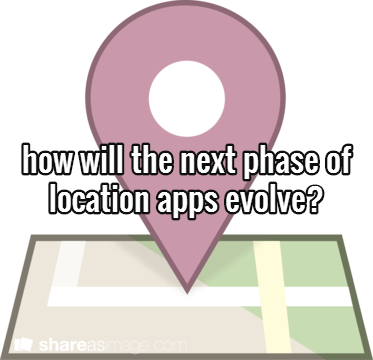
If a dog-year is equivalent to 7 human years then for an internet start-up 12 months can equate to a lifetime. With that in mind Foursquare, which was launched way back in 2009, is positively ancient and had recently been seeming appropriately fragile: whilst it was valued at $600 million in 2011, its last financing round was based on debt rather than new shares, with rumours suggesting this was because doing this meant it didn’t have to renew its valuation, which might actually have fallen.
In its early days Foursquare was widely lauded as heralding a new wave of social apps based on location and gamification; it beat its biggest competitor, Gowalla, and arguably led to Facebook launching its own check-in functionality. However over time its popularity and growth have waned as users have proven unwilling to share their location so explicitly; this has led to Foursquare announcing a major rebrand and change of direction.
Going forward Foursquare will have two apps; the original incarnation will concentrate solely on local recommendations for bars, restaurants and the like, and won’t require any sort of check-in. Foursquare’s systems and algorithms are now sophisticated enough, they claim, to allow them to pinpoint where people are, based on background data, and to predict the types of places they are likely to want to visit. For those who still long to be able to check-in in order to share their location and to be able to find their friends, a new app called Swarm will also be launched.
Whilst it is impossible to predict how well this rebrand, or pivot, will do, there are some obvious lessons for marketers.
Firstly, it highlights that whilst innovation and experimentation are important, marketers should also always aim to keep in touch with actual human behaviours. Many of those leading the call for brands to jump on board with location apps back in the late noughties were not exactly average punters; they tended to be rather geeky early adopters. Our job is, I would suggest, to stay just ahead of the average consumer but with an eye on what is happening at the bleeding edge.
Secondly, it highlights how location has ended up being one of the primary functions for mobile, just without the check-in. Many of the articles suggest that Foursquare is looking to unseat Yelp, the directory app which is listed on the stock market at $4.6 billion USD. If it can use its vast data-set to seriously target this sector, it could suddenly become a much more interesting proposition for any advertiser with physical locations.
It also shows just how much has changed in the last 5 years; Foursquare was set up by the founders of a company called Dodgeball, which had been acquired by Google after the search giant essentially shut it down after buying it. Dodgeball was based on SMS data; Foursquare was based on check-ins. In 2014, all you have to do to get recommendations is carry a phone.
Google Now aims to predict what you are going to want to do and provide you with the information to do so before you even have to ask; Apple’s Siri is also moving in that direction, albeit slowly. This is, in many ways, what Foursquare is looking to do as well, but whilst it has developed highly advanced technology to do so, it doesn’t have access to the same range of signals (email, search, browser history, etc..) as a Google or Apple. The question remains whether Foursquare has made this pivot that little bit too late.
One of the buzzwords of the last few years was undoubtedly big data, but many people are now realising that success isn’t based on how much data you have but how cleverly you use it. Foursquare has done an incredible job to build a prediction engine that can present restaurant recommendations based on background activity; the problem is that Google potentially also has all of that, but also all the explicit data that can be gathered from airline check-in emails, searches for cinema times and the like, and are past masters at using it smartly. Their recent acquisition and integration of social sat-nav company Waze shows that this is an area they have a lot of interest in.
Success for Foursquare is, realistically, most likely to come from an acquisition from a deep-pocketed competitor. One can imagine reasons that any of Facebook, Google or Apple might find for buying them. Foursquare obviously hope that they can still go it alone, but regaining the sort of momentum they had is likely to be hard work, and possibly expensive (they may need to move from relying on recommendation to trying advertising). Ultimately, how good their product is will decide that.
As marketers then, we should be keeping an eye on Foursquare, and to a certain extent on Swarm, to see how the next phase of location apps evolve; for those with physical locations, there will undoubtedly be interest in having more competitors for ad dollars. But what this ultimately suggests is that we need to get ready for a world where recommendations come from connected devices and algorithms, not friends and family. And where we need to move from thinking about optimizing websites and media plans to one where we look to optimize physical locations so that they show up in the here and (Google) Now